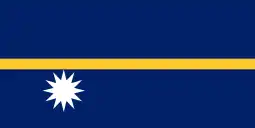Elections in Nauru
Nauru elects on a national level a head of state (the president) and a legislature. Parliament has 19 members (increased from 18 for the 2013 election), elected for a three-year term in multi-seat constituencies.[1] The president is elected for a three-year term by the parliament.
 |
|---|
However, there are frequent changes of government in Nauru which occur without an election; most recently, in December 2007, that of President of Nauru Marcus Stephen came to office following a Parliamentary vote of no confidence which overturned the preceding Administration of Ludwig Scotty, reelected just a few weeks previously with a landslide majority.
Voting system
The 19 seat members of the Parliament of Nauru are elected through the Dowdall System, a decimalised modification of a preferential Borda count. The voter must rank all candidates in order of preference (see preferential voting). Each vote is then counted using the formula 1/n, according to ranking order. For example, a candidate ranked first receives one point, the second candidate receives half a point, the third candidate receives a third of a point, and so on. Each legal vote is aggregated in order to determine a decimal score for each candidate.[2] For example, in the June 2010 Nauruan parliamentary election the then president Marcus Stephen regained his Anetan Constituency seat after receiving 349.617 decimal votes from a total of 630 votes. [3]
Voter eligibility and election administration
The voting age in Nauru, as specified by the Article 29 of the Constitution, is 20 years old.[4] Voting is compulsory for citizens of Nauru. Early voting is held for the week before elections, for Nauruans who cannot make it to the polls on election day. A proxy can be appointed if a Nauruan citizen is out of the country on election day.[5]
Elections in Nauru are administered by the Nauru Electoral Commission.[6] Before its founding in 2016, elections were administered by the chief secretary, a political appointment by the president.[7]
Latest elections
See also
References
- "Who comprises Parliament? - The Government of the Republic of Nauru". Archived from the original on 24 August 2019. Retrieved 22 February 2015.
- "Nauru". Electionguide.org. Retrieved 13 December 2011.
- "Results of the General Election held on 19th June, 2010" (PDF). naurugov.nr/parliament/index.html. Archived from the original (PDF) on 22 January 2013. Retrieved 16 December 2011.
- "Nauru". ACE Electoral Knowledge Network. 2019. Retrieved 30 September 2023.
- "For Voters". Nauru Electoral Commission. Retrieved 30 September 2023.
- "Nauru". Freedom House. 2022. Retrieved 30 September 2023.
- "Nauru elections: Commonwealth brings 'credibility in strengthening democracy'". Commonwealth of Nations. 17 February 2017. Retrieved 30 September 2023.
